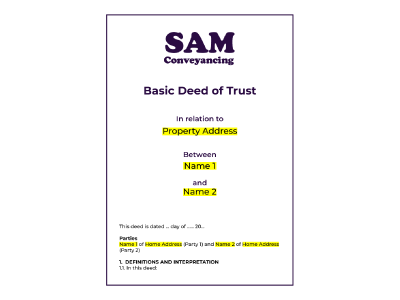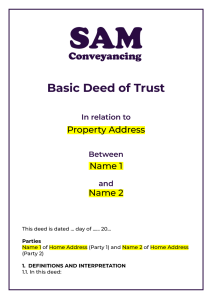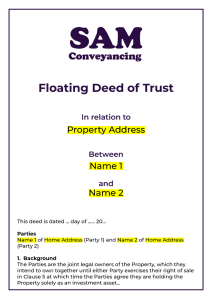Deed of Trust to Protect Money In Property
Buying a property with someone? While exciting, it's crucial to protect your investment. A Deed of Trust clearly outlines each owner's financial stake and responsibilities, preventing costly disputes down the line.
A Deed of Trust is drafted by a solicitor, normally during the conveyancing process when buying. However, you can draft a Deed of Trust after your purchase at any time but can only have a Deed of Trust to protect your money in a property if you hold it as Tenants in Common, not joint tenants. You're able to sever the Joint Tenancy and register as Tenants in Common to then get a Deed of Trust too.
Disputes over property ownership can be incredibly expensive, potentially costing tens of thousands of pounds in legal fees. Therefore, a Deed of Trust should be created to clearly outline each owner's beneficial interest share and the process for recouping their investment (proceeds upon sale), preventing costly and stressful legal battles.
Common misconceptions about Deeds of Trust
Understandably, there's some confusion surrounding Deeds of Trust. Here are a few common misconceptions we often encounter:
Misconception 1: A Deed of Trust is the same as a mortgage
This is incorrect. A mortgage is a loan secured against the property to protect the lender, while a Deed of Trust protects the ownership shares and financial responsibilities of the co-owners. A mortgage is with a lender; a Deed of Trust is between the owners.Misconception 2: If we're married, we don't need a Deed of Trust
While assets are often shared in a marriage, a Deed of Trust can still be crucial, especially if one party contributes a significantly larger deposit, has separate pre-marital assets invested in the property, or if there are children from previous relationships. It provides clarity and protection in case of separation or other life changes. If you are married and hold unequal shares in the property, you must submit Form 17 to HMRC for income tax purposes.Misconception 3: A verbal agreement is sufficient
Unfortunately, verbal agreements about property ownership are very difficult to enforce legally. A Deed of Trust is a legally binding written document that provides clear evidence of the agreed-upon terms. Without it, disputes can become complex and costly to resolve. For example, if you think one co-owner will backtrack from an original verbal agreement about sale proceeds, it's best to get it in writing and formally recognised in a deed.Misconception 4: A Deed of Trust only covers the initial deposit
A Deed of Trust can cover much more than just the initial deposit. It can also include future mortgage repayments, renovation costs, and other agreed-upon expenses, ensuring a fair distribution of assets upon sale.
Protect your interest in a property and confirm how to sell. Drafted by a solicitor.
The first draft is within 1 to 2 working days* and includes:
- Deposit paid.
- The percentage ownership of each party.
- How to share expenses like the mortgage and bills.
- Share of property income - rent or gain on sale.
- How to sell the property.
- How the property is divided in the event of separation, divorce, or death.
What happens if joint owners don't have a Deed of Trust?
Like any financial agreement, verbal agreements regarding property ownership are difficult to enforce.
Without a written, signed, and witnessed Deed of Trust, co-owners must prove who gets what in the sale proceeds. This can be a complex and expensive process, often requiring mediation or court intervention.
Without a formal Deed of Trust specifying each owner's beneficial interest (their share of the property's value), proving ownership can become complex. A Deed of Trust provides indisputable evidence of each party's financial stake.
It may even be the case that the parties look to force a sale to get their money from the property.
What money can be protected?
A Deed of Trust can protect more than just the initial deposit and it can be structured in different ways. It can also cover:
- Purchase Deposit - This ensures each owner's initial investment is accounted for and will be protected. It's especially useful if there was a gifted deposit involved from one owner's parents, ensuring the parents or the child gets that money back.
- Mortgage Repayments - The Deed can specify how mortgage repayments are shared, even in unequal proportions, allowing owners to build equity at different rates. This is particularly useful when one party contributes more to the mortgage.
- Renovations - The agreement can detail how contributions to renovations affect each owner's share of the property's value. This prevents disputes if one party invests significantly in home improvements.
- Household bills - The Deed can outline responsibility for various household expenses, ensuring clarity and preventing disagreements.
Deeds of Trust can be structured in different ways. A standard Deed of Trust assigns a fixed percentage of ownership to each party (e.g., 50/50 or 70/30).
However, a "floating" or "variable" Deed of Trust offers more flexibility. This type of agreement allows ownership percentages to change over time, typically based on each owner's ongoing contributions to the property, such as mortgage payments, renovations, or other agreed-upon expenses.
This can be especially useful in situations where contributions are expected to vary significantly.
Protect your interest in a property and confirm how to sell. Drafted by a solicitor.
The first draft is within 1 to 2 working days* and includes:
- Deposit paid, costs of purchase, mortgage repayments and renovations.
- How to share property expenses, including the mortgage and bills.
- Share of property income - rent or gain on sale.
- How to sell the property.
When should you review a Deed of Trust?
A Deed of Trust is not a "set it and forget it" document. It's important to review and update it when significant life or financial changes occur. Here are some key times to consider a review:
Relationship status changes
If the co-owners get married, divorced, or separate, it's crucial to review the Deed of Trust to ensure it still reflects their intentions.Significant renovation or improvement work
If one or more owners contribute significantly to renovations or home improvements, the Deed of Trust should be updated to reflect the change in each party's financial stake in the property.Changes in financial circumstances
If one owner's financial situation changes significantly (e.g., due to job loss or a large inheritance), it might be necessary to adjust the Deed of Trust to reflect their altered contributions or responsibilities.Adding or removing an owner
If a new owner is added to the property or an existing owner wishes to sell their share, the Deed of Trust must be amended to reflect the new ownership structure.
Even if no major changes occur, it's a good idea to review your Deed of Trust every few years to ensure it still aligns with your current circumstances and intentions.
How to get a Deed of Trust
We offer a range of tailored Deed of Trust services to suit various circumstances:
Deed of Trust as you're purchasing
This is ideal for unmarried couples, friends, or family buying a property together. It clearly defines each owner's financial contributions, percentage of ownership, and outlines procedures for selling the property or handling a separation. Protect your investment and avoid future disputes with a clear and legally sound agreement.
Deed of Trust for Tax Optimisation - Deed of Assignment
If you're a landlord sharing rental income with a partner (especially if married), this Deed of Trust, or Deed of Assignment, can help optimise your tax liability.
It should be filed alongside a Form 17 declaration to HMRC. If you currently own the property as joint tenants, we can also assist with severing the joint tenancy. Maximise your tax efficiency and ensure accurate reporting with HMRC.
Floating (or Variable) Deed of Trust
This flexible agreement is perfect for situations where ownership percentages may change over time.
It allows for adjustments based on individual contributions to mortgage payments, renovations, or other agreed-upon expenses. Reflect your evolving investment accurately and fairly with a dynamic ownership structure.
Deed of no beneficial interest - non-owners living in the home and contributing to the household
This specialised Deed is necessary for those using a joint mortgage with a sole proprietor mortgage product. It formally declares a zero beneficial interest for one party to avoid paying additional stamp duty on a second home. Avoid unnecessary tax burdens with this deed or declaration document.
Our Deeds are drafted by experienced solicitors within 1-2 working days* for a fixed fee, starting at £304.
Talk through your needs and options with one of our specialists on 0333 344 3234 (local call charges apply) or click the button below to get a quote.
Andrew started his career in 2000 working within conveyancing solicitor firms and grew hands-on knowledge of a wide variety of conveyancing challenges and solutions. After helping in excess of 50,000 clients in his career, he uses all this experience within his article writing for SAM, mainstream media and his self published book How to Buy a House Without Killing Anyone.
Caragh is an excellent writer and copy editor of books, news articles and editorials. She has written extensively for SAM for a variety of conveyancing, survey, property law and mortgage-related articles.















